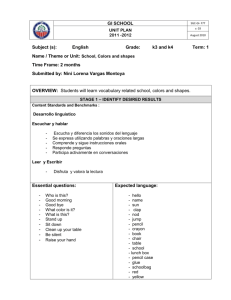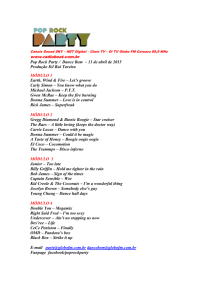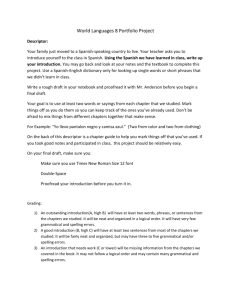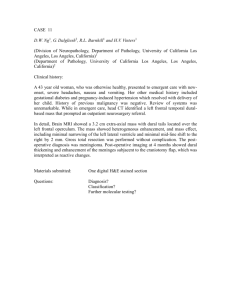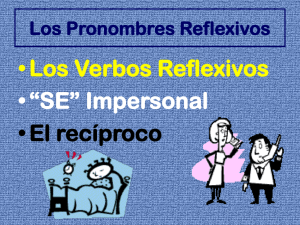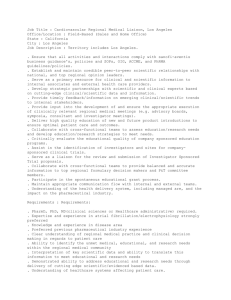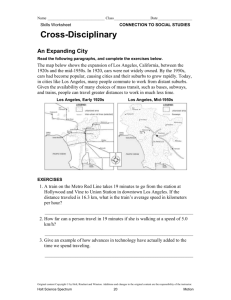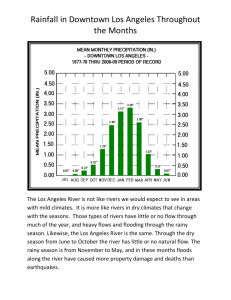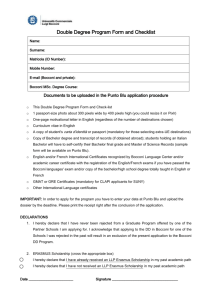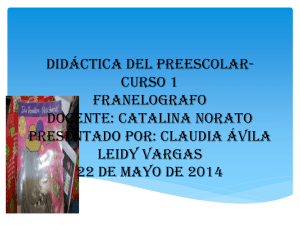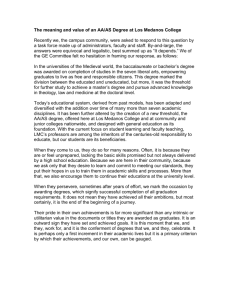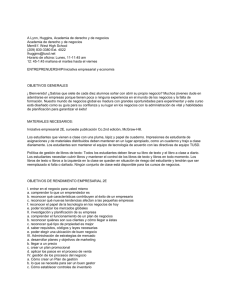B1 business - Bocconi University
advertisement
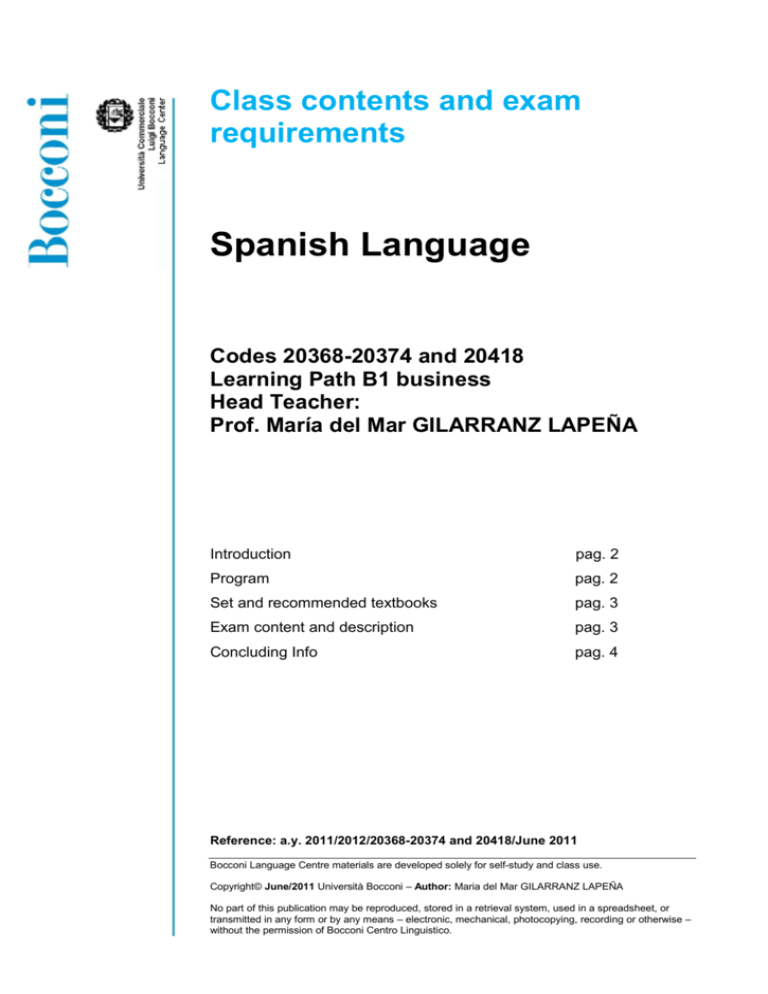
Class contents and exam requirements Spanish Language Codes 20368-20374 and 20418 Learning Path B1 business Head Teacher: Prof. María del Mar GILARRANZ LAPEÑA Introduction pag. 2 Program pag. 2 Set and recommended textbooks pag. 3 Exam content and description pag. 3 Concluding Info pag. 4 Reference: a.y. 2011/2012/20368-20374 and 20418/June 2011 Bocconi Language Centre materials are developed solely for self-study and class use. Copyright© June/2011 Università Bocconi – Author: Maria del Mar GILARRANZ LAPEÑA No part of this publication may be reproduced, stored in a retrieval system, used in a spreadsheet, or transmitted in any form or by any means – electronic, mechanical, photocopying, recording or otherwise – without the permission of Bocconi Centro Linguistico. Spanish Course - Codes 20368-20374 and 20418 a.y. 2011/2012/20368-20374 and 20418/June 2011 B1 business course This course is aimed at students who have a B1 general entry level knowledge of the language and is designed to prepare them for the final exam at B1 business level. This is a curricular course giving students credits for a B1 exit level (as established by the Council of Europe). The course consists in one module, sub-divided in two semesters: - II semester, 1°year course (code 20368-Path B1, lessons only) - I semester, 2°year course (code 20374-Path B1 business, lessons + exam). Please remind that the class group is run if the minimum number of applicants is reached. Program The course helps students to build up business-related vocabulary and enables them to communicate in a professional context. Class work aims to develop students’ grammar, lexical, communicative and pragmatic competences and focuses on professional, economic and social situations. The syllabus covers the following topics: Argumentos Contenidos temáticos AVE B1*: Temas 1, 2, 3, 4 (todas las sesiones). MÓDULO 1 1 La responsabilidad empresarial La economía social en España. La empresa. El Pacto Mundial. Los pueblos indígenas de América Latina. 2 El desarrollo sostenible Energías para el futuro. La política medioambiental. Productos Bio y automóviles verdes. El patrimonio cultural de la humanidad. 4 Empresas y globalización IBERIA La internacionalización y la expatriación Seleccionar candidatos La empresa multicultural. Negociar con extranjeros. El viaje de negocios. Consejos para progresar en el trabajo MÓDULO 3 5 Liderando empresas 6 ¡A ganar mercados! EL liderazgo y los líderes El Blog La nueva España El éxito en los negocios. El consumo y los consumidores El turismo español. MÓDULO 4 Presente de Indicativo Pretérito Imperfecto y Perfecto Participio pasado Ser / estar La obligación Presente Subjuntivo. Usos del Subjuntivo Futuro Indicativo. Usos El superlativo Muy / Mucho AVE B1: Temas 4, 5, 6 (todas las sesiones). MÓDULO 2 3 En los mercados exteriores Contenidos gramaticales Pretérito Indefinido y Pluscuamperfecto Cambios ortográficos La forma progresiva La concesión. Aunque Imperativo Los pronombres personales Uso de los pronombres con el imperativo Temporales AVE B1: Temas 7, 8, 9 (todas las sesiones). Condicional. Usos. Futuro perfecto. La probabilidad Por y Para Imperfecto de Subjuntivo Tiempos compuestos. Correspondencias temporales. Oraciones condicionales. Quisiera AVE B1. Temas 10, 11, 12 (todas las sesiones). 2 Spanish Course - Codes 20368-20374 and 20418 7 Cada día más experiencia 8 Juntos se puede a.y. 2011/2012/20368-20374 and 20418/June 2011 Motivar a los empleados Marcas líder en América Latina Emprendedores Latinoamericanos La mujer en el mundo del trabajo Relaciones Europa América Latina Las nuevas tecnologías El estilo indirecto La impersonalidad La forma Pasiva Pero, sino, sino que Consecutivas Causales Ser / estar Como si Oraciones reduplicativas * AVE B1 can be found at the Language Centre, Language Laboratory. In order to get the most out of the course, students are advised to do the exercises on the following textbook: Mar Gilarranz Lapeña, María Cristina Bordonaba Zabalza. Negociar en español. Comunicación, gramática y cultura en lengua española. Milano. EGEA, 2010. Set textbook: − Gisèle Prost, Alfredo Noriega Fernández, Al di@. Curso intermedio de español para los negocios. Libro del Alumno. Madrid. SGEL, 2009. Recommended books: Mar Gilarranz Lapeña, María Cristina Bordonaba Zabalza. Negociar en español. Comunicación, gramática y cultura en lengua española. Milano. EGEA, 2010. J.C. Barbero / F. San Vicente, Actual. Gramática para comunicar en español. Bologna. CLUEB 2006. B1 business exam Knowledge is assessed by one of the following methods, among which students can choose: • international certification from among those recognized by the University (see www.unibocconi.eu > Language Center > Language Certificates ), or • Bocconi exam, which corresponds, like international certificates, to the Common European Framework standards. The exam consists of a written paper and an oral exam. Both the written and the oral exam need to be passed. In order to take the oral exam, it is necessary to: • pass the written exam (minimum mark 18/30) • have a test score that hasn’t expired, i.e. that is still valid (see Written Exam, Validity). Students can choose to retake the written exam before the taking the oral exam but must remember that handing in their paper annuls any previous grade given. Students must enroll for all the exam via the Punto Blu. Written exam The written exam is divided in two parts, the first is listening, the second reading comprehension. The final grade is the total score from the two in thirtieths. Both mono- and bi-lingual dictionaries can be used. Duration of exam: 120 minutes from the end of the listening being played. Description of exam stages First Listening to two passages-monologue or dialogue-containing data, opinions, part descriptions, explanations Objective To verify: With the first passage, oral comprehension and the capacity to make accurate notes about facts and figures heard; - with the second passage, ability to refer/report correctly, in a structured text, the information and opinions contained in the passage, possibly also adding own ideas. Exam 1.Sentence and/or table completion; true/false questions; multiple choice 10/30 questions, open and/or closed questions 5/30 2.Writing a memo, letter or short report, following the instructions given 3 Spanish Course - Codes 20368-20374 and 20418 Second part Objective Exam a.y. 2011/2012/20368-20374 and 20418/June 2011 Reading comprehension of one or more authentic texts, possibly containing graphs, tables and images. To verify: -Correct understanding of written texts; -ability to report accurately the information expressed in texts expressing personal opinions. 15/30 Writing a short report on the topic given, according to a personal standpoint. Listening stages Listening to 1st passage Listening to passage 2nd Pause repeat listening to first longer pause while exercises are passage completed Pause Repeat listening to 2nd 120 minutes for the completion of the passage written exam Validity The written exam is valid a limited amount of time: • if passed by 31st December 2012, it is valid for the 3 subsequent oral exams • if passed from 1st January 2013, it is valid for the 3 subsequent oral exams, and it is also valid for the subsequent 12 months but there is a penalty that must be paid (see Oral Exam, Validity) Oral exam The oral exam consists of two parts: presentation and analysis of a text chosen by the teacher during the exam; this is either a company case study or socio-economic topic with discussion of the contents. Duration of exam: 20 minutes Description of exam stages Presentation Carrying out the task given (10-12 minutes) Discussion Discussion on the topic of the presentation lead by the examiners with ad hoc questions (8-10 minutes) Validity The oral exam can only be taken once you have passed the written exam (see Written Exam). Students will be assessed in terms of their practical ability to communicate. During the oral exam marks can be added to or subtracted from the written exam result in the following way: • by +3 or -3, if the oral exam is passed within the 3 oral exams subsequent to the written exam • by +1 or -3, if the oral exam is passed after the first 3 subsequent oral exams, but still by 12 months subsequent to the written exam (this option is possible only for students who take the written exam after 1st January 2013). Concluding info Up to 2 additional points (two/thirtieths) may be added to the final grade when a student has attended the course, participated actively in it and completed self-study assignments. These points are awarded at the teacher’s discretion as follows: • 1 thirtieth for attending at least 75% of the classroom lessons (total classroom teaching hours: 72, codes 20367 and 20373); • 1 thirtieth for completing the self-study program as indicated by the teacher. The total additional points are added by the teacher at the end of the annual course according to criteria as explained in class or as described on line (in each language’s Library, Bocconi elearning platform) and are valid for nine months after the end of the course (January-September inclusive). 4
